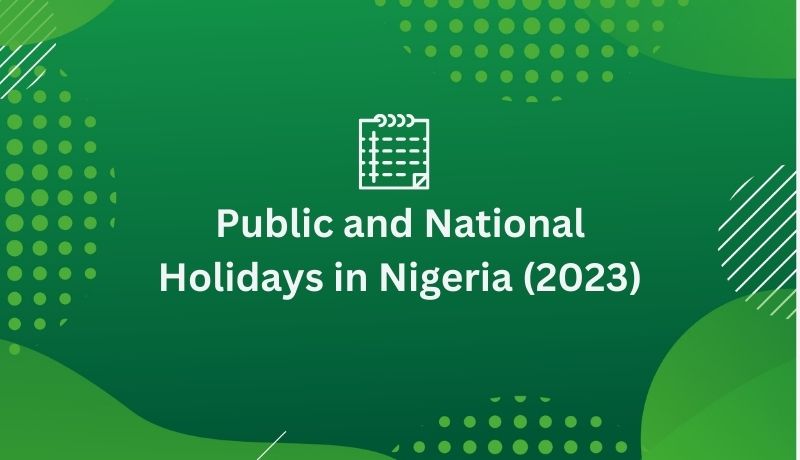As a Nigerian or someone interested in Nigerian culture, you’ll want to know when the big celebrations are happening. Nigeria has over 250 ethnic groups and more than 500 languages, so there are lots of diverse cultural and religious festivals throughout the year. Some of the major holidays are tied to Islam and Christianity, the two dominant religions in Nigeria, while other celebrations are secular or tied to historical events.
If you’ve got trips planned to Nigeria or want to understand the cultural calendar better, this guide will give you the rundown of all the Public and National holidays in Nigeria in 2023.
Overview of Public Holidays in Nigeria
Nigeria recognizes several public holidays each year to commemorate important events or people in the nation’s history. Most businesses and schools close for the day on these holidays.
New Year’s Day: The first day of the year is a public holiday in Nigeria. People gather with friends and family to celebrate.
Democracy Day: Held annually on May 29th, Democracy Day commemorates the restoration of democracy in 1999 after years of military rule. It’s a day to reflect on the democratic process in Nigeria.
Eid al-Fitr: Eid al-Fitr, also called the “Festival of Breaking the Fast,” marks the end of Ramadan fasting for Muslims. It’s a joyous time when people gather for prayers, share meals with loved ones, exchange gifts and donate to charity. The date changes each year based on the Islamic calendar.
Independence Day: On October 1, 1960, Nigeria gained independence from British rule. Independence Day is a major national holiday to celebrate freedom and reflect on Nigeria’s history and development as an independent nation. There are events, parades, parties, and festivals around the country.
Eid al-Adha: Eid al-Adha honors the willingness of Ibrahim (Abraham) to sacrifice his son as an act of obedience to God’s command. Muslims worldwide celebrate Eid al-Adha with prayers, sharing meals with family and friends, and donating meat to those in need. The date of Eid al-Adha changes annually based on the Islamic calendar.
Id el Maulud: This day celebrates the birth of the Prophet Muhammad (SAW). With special prayers and events, the Muslim community honors his teachings and life.
Good Friday (Friday before Easter Sunday): A Christian religious holiday commemorating the crucifixion of Jesus Christ.
Easter Monday (Monday after Easter Sunday): The day after Easter Sunday.
Worker’s Day: Also known as Labor Day, it honors the role and achievements of workers.
Children’s Day: Children’s Day is a commemorative date celebrated annually in honor of children.
Christmas Day: A Christian religious festival celebrating the birth of Jesus Christ.
Boxing Day: The day after Christmas, a public holiday for many Commonwealth nations.
With a mix of secular and religious, cultural, and political holidays recognizing milestones in Nigeria’s history, there are many opportunities each year for Nigerians to come together in celebration and community.
Public and National Holidays in Nigeria (2023)
Nigeria has several public and national holidays each year. These are days off from work for most Nigerians to celebrate or commemorate important cultural events or religions.
- 1st of January Sunday: New Year’s Day
- 2nd of January Monday: New Year Holiday
- 7th of April Friday: Good Friday
- 10th of April Monday: Easter Monday
- 21st of April Friday: Id el Fitri
- 24th of April Monday: Id el Fitri Holiday
- 1st of May Monday: Labour Day
- 27th of May Saturday – Children’s Day (Public Holiday for Schools and Children only)
- 12th of June Monday: Democracy Day
- 28th of June Wednesday: Eid el Kabir
- 29th of June Thursday: Eid el Kabir
- 27th of September to Wednesday: Eid el Maulud
- 1st of October Sunday: National Day or Independence Day
- 2nd of October Monday: National Day Holiday (this is because Independence Day falls on Sunday)
- 25th of December Monday: Christmas Day
- 26th of December Tuesday: Boxing Day
Conclusion
So there you have it, a full list of the public and national holidays in Nigeria in 2023. With a mix of religious and cultural celebrations as well as memorial holidays, you’ll have plenty of opportunities to unwind, connect with loved ones, reflect on the past, and look toward the future.
As 2023 is coming to an end, take time to appreciate each moment and holiday, both big and small. Make memories, practice gratitude, and spread kindness; these are the gifts that truly keep on giving.
